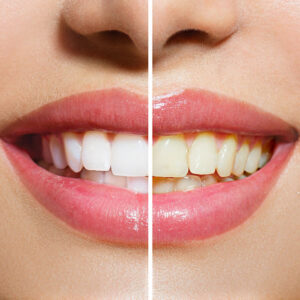
Have you noticed that the shade of your teeth is starting to change over time? Whether all of your teeth are becoming discolored or you’ve noticed one particular tooth that is different from the rest, you are likely seeking to talk to a cosmetic dentist about how to fix discolored teeth.
In order to identify the best answer for how to fix teeth discoloration, it’s important to get to the root of the problem: the reason why your teeth are becoming discolored. Then, talk to a dentist to identify the most effective tooth whitening solution for your unique needs.
Common Causes of Tooth Discoloration
Even the whitest teeth can start to look discolored over time. You might look in the mirror and see they aren’t as white as before. They might start to have a yellowing hue, or you could notice dark flecks that can’t be scrubbed off with a toothbrush.
Extrinsic discoloration occurs because of factors that are affecting the outside of your teeth, such as the food and beverages you are consuming. Intrinsic discoloration originates inside the tooth.
There are a variety of reasons why teeth can change color, including:
- Aging: It’s normal and expected that the teeth will change in color as you get older. As the enamel gets thinner, the underlying dentin is exposed, causing your teeth to look yellow. At what age do teeth start to yellow? It varies, depending on genetics, but people usually start to notice a difference in mid-life.
- Food and Drink: Did you know that the things you are eating and drinking can discolor your teeth? Common culprits include coffee, soda, wine, soy sauce, berries, and other dark-colored foods.
- Tobacco and Smoking: If you are a smoker or use tobacco regularly, then the risk of tooth discoloration increases. Smokers have a much higher likelihood of tooth discoloration.
- Dental Habits: Daily brushing and flossing are not only important for protecting dental health but can also affect your risk of discoloration. If you don’t remove plaque through brushing and regular dental cleanings, then discoloration can start to develop.
- Fluoride: Even though fluoride is beneficial for protecting and strengthening the tooth when used correctly, there is a risk of too much of a good thing. Too much fluoride (especially in childhood) can result in tooth discoloration with white spots on the enamel of the teeth.
- Trauma: If a tooth is damaged or injured, it can become discolored. A car crash, fall, or sports injury can damage the tooth, causing an eventual change in color.
- Disease: Certain health conditions can increase the risk of tooth discoloration, including celiac disease, liver disease, eating disorders, and metabolic diseases.
- Medications: Some prescription medications can affect the color of the teeth, such as certain types of antibiotics, drugs for high blood pressure, and antihistamines.
- Medical Treatments: Sometimes, cancer treatments such as radiation and chemotherapy can affect the teeth and cause discoloration.
Why Are My Teeth Suddenly Discolored?
If you notice a sudden change in your tooth color, you should be wondering how to fix discolored teeth, and it’s also important to determine the underlying cause. For example, you might talk to your doctor about changing medication or evaluating your overall health if needed.
Can Teeth Discoloration Be Reversed?
Are you wondering how to fix tooth discoloration by reversing it? Can discolored teeth be whitened? Extrinsic tooth discoloration can be an easy fix because you only need to know how to fix stained teeth – it’s possible to whiten the outer layer of the teeth. In just one or two professional teeth whitening appointments, you will notice a drastic difference.
On the other hand, more intensive cosmetic dental treatments might be necessary for intrinsic tooth discoloration. You might consider veneers if all the teeth are discolored. Or a crown can sometimes be a good solution if you want the best treatment for how to fix a discolored tooth (single treatment, not the entire mouth).
Is a discolored tooth dead? Not necessarily. However, it’s important to consult your dentist to rule out serious dental issues.
Top 6 Treatments: How to Fix Discolored Teeth
If you are looking for information about fixing discolored teeth, then your dentist is the best resource. There is a lot of information online, but make sure that you are getting this information from reputable sources.
Here are some of the options you might consider for how to fix discolored teeth:
- Professional teeth whitening – in-office treatments offering the fastest and safest results
- Laser teeth whitening
- At-home whitening strips
- Teeth whitening toothpaste
- Teeth whitening mouthwash
- Teeth whitening kits (gel and trays)
Over-the-counter products can make a bit of a difference, but they don’t produce the same results possible from a professional treatment. Also, it’s important to use caution with these at-home kits to avoid damaging the teeth.
Don’t underestimate the importance of changing your habits after teeth whitening. Avoid food and drink that can cause discoloration, and make sure that you are consistent with brushing and flossing.
Talk to the Pros: How to Fix Discolored Teeth
For more information about tooth whitening and other cosmetic dentistry services, contact our team to schedule a consultation. myDental offers a variety of cosmetic services to help you achieve your ideal smile. We have multiple locations for your convenience. Call today for more information and to schedule an appointment with our dental specialists.